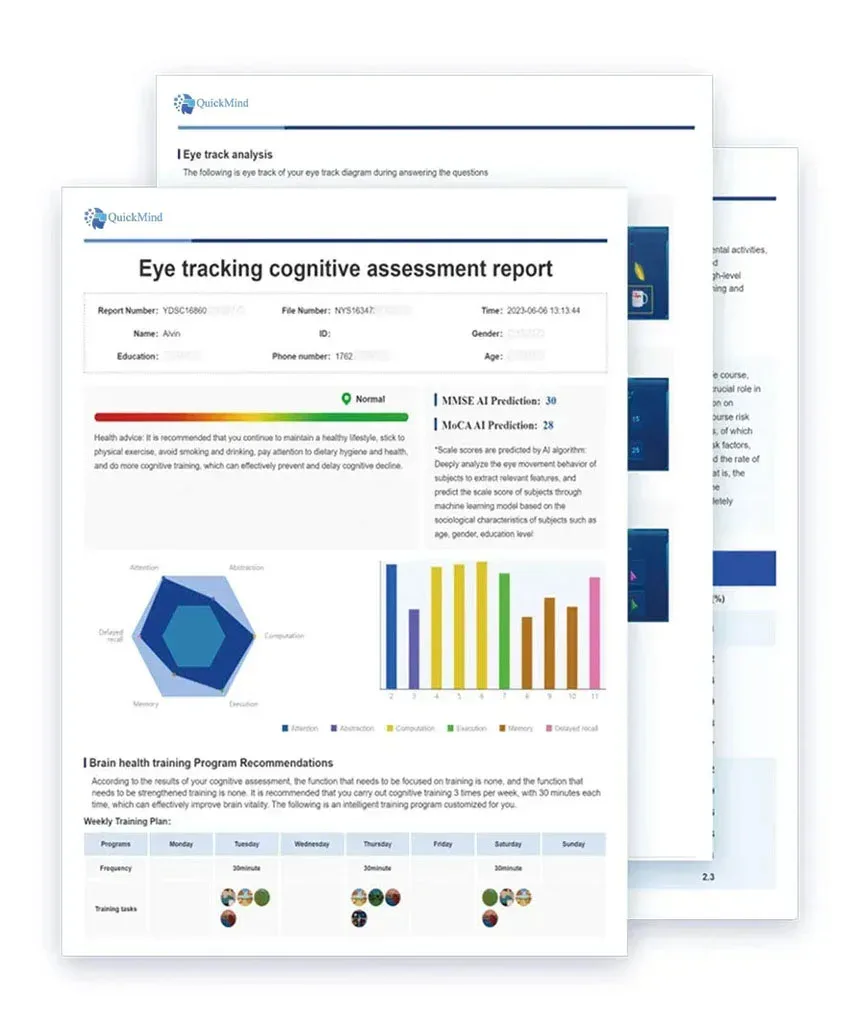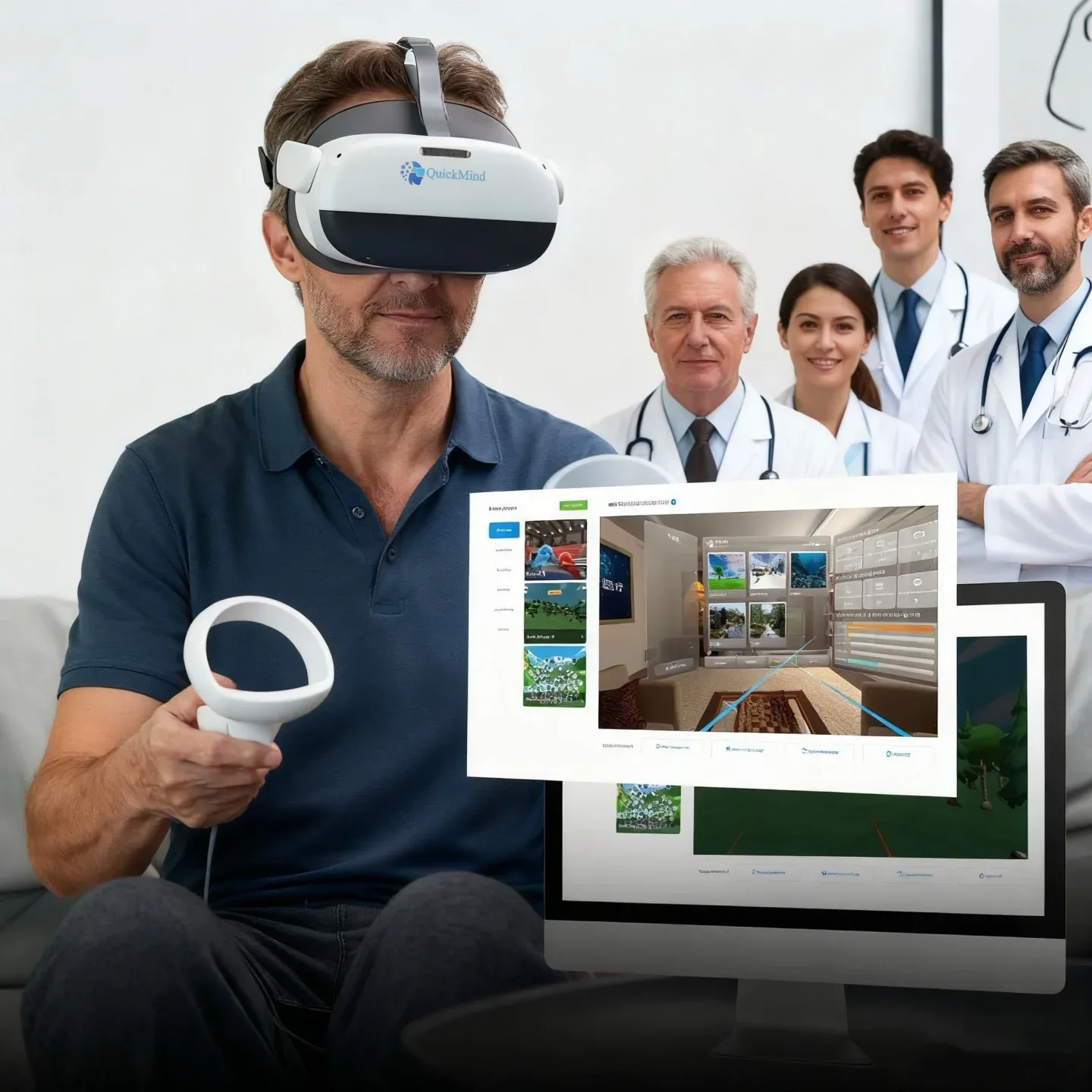
Increasing studies shows that Virtual Reality treatment can markedly elevate the health of participants coping with dementia. By transporting them to peaceful environments, VR presents a novel pathway for mental involvement, feelings management, and social interaction. A variety of inquiries have indicated that VR therapy can lower restlessness, anxiety, and low mood in dementia users while also boosting their memory, heedfulness, and dialogue proficiency.
- VR enables subjects with dementia to revisit treasured recollections through hands-on representations.
- Likewise, it can deliver a comfortable and nurturing space for social engagement, building a sense of attachment and adherence.
- Authorities maintain that VR therapy has the capability to overhaul dementia care by offering new and groundbreaking techniques to address the challenging difficulties faced by users living with this disorder.
Tech-Driven Cognitive Therapies for Alzheimer's Patients
Innovative software-based methods are showing promise in the realm of mental improvement for persons diagnosed with Alzheimer's ailment. These software harness computing power to boost brain performance and potentially impede the evolution of the syndrome. Engaging activities, personalized recommendations, and intellectual training are some demonstrations of methods being researched in this growing field. While examinations are underway, digital therapeutics offer a supportive option for augmenting the quality of those dealing with cognitive Alzheimer's illness.Digital Terrain Exploration in Alzheimer's Disease Management
Touching patients experiencing Alzheimer syndrome, the persistent degradation of cognition and mental skills can notably influence their ability to relate with the external setting. This harmful illness often elicits in seclusion, distress, and a reduced self-recognition. Modern refinements in virtual reality technology deliver a groundbreaking avenue to counteract these concerns by creating immersive scenarios that can engage the brain and revive cognitive function.
Virtual scenario worlds configured specifically for Alzheimer's individuals can send them in familiar locations, such as their juvenile habitat or a popular natural site, stirring positive memories and decreasing anxiety. Through interactive exercises, these virtual environments can also stimulate cognitive abilities like remembrance, attention, and decision-making.
The possible gains of virtual reality in Alzheimer's remediation are considerable. Early analyses have confirmed encouraging results, with clients experiencing improvements in cognitive faculty, mood, and overall quality of life. As this technique continues, it holds the key to innovating the way we approach Alzheimer's disease, due a new pathway for treatment and empowerment.
Virtual Memory Therapy for Alzheimer's Clients
Reminiscence therapy is a widely recognized technique used to elevate cognitive function and psychological wellness in individuals with Alzheimer's disease. This classic form of therapy involves inducing patients to share past experiences, often through interchange. However, a cutting-edge approach is emerging: VR-mediated reminiscence therapy.
This immersive innovation utilizes virtual reality headsets to bring patients in faithful environments that invoke memories from their past. By participating these man-made contexts, individuals with Alzheimer's can communicate with their past in a meaningful way.
Virtual Reality as a Memory and Cognitive Booster in Dementia
Virtual reality (VR) is emerging as a aspiring device in the fight against dementia, delivering revolutionary ways to boost memory and cognition. By constructing immersive scenarios, VR can aid individuals with dementia access memories, involve in meaningful activities, and elevate cognitive aptitudes. Studies have established that VR interventions can lead to considerable improvements in memory recall, attention, and navigational awareness. Moreover, VR provides a reliable and inviting space for individuals with dementia to express, reducing feelings of isolation and worry.
- Besides, VR can be fitted to individual needs and preferences, allowing enhanced levels of connection.
- Regardless of the chances of VR, continued research is needed to fully understand its long-term benefits in dementia care.
Memory Revival and Social Renewal: VR's Role in Alzheimer's Community Engagement
Computer-generated synthetic settings is emerging as a groundbreaking mechanism in the area of cognitive disorders. By generating interactive and communicative platforms, VR has the opportunity to encourage memories, cultivate social interaction, and augment the overall quality of life for users managing Alzheimer's. Arguably the most promising aspects of VR is its ability to shift users to classic venues and memories from their past. Whether it's a visit to a childhood home or a reenactment of a beloved holiday, these virtual explorations can trigger happy memories and solidify cognitive capacity. Furthermore, VR can enable social interaction by connecting individuals with others who share similar memories. This can be particularly helpful for people with Alzheimer's who may grapple with traditional social participation. By creating a safe and interactive virtual space, VR can alleviate feelings of isolation and digital therapy loneliness, which are common among persons coping with Alzheimer's. Overall, VR holds immense likelihood for overhauling the lives of persons with Alzheimer's by awakening memories, renewing connections, and elevating their quality of life. As technology evolves to improve, we can expect even more revolutionary applications of VR in the field of dementia care.Incorporating Cognitive Training: Using VR to Manage Alzheimer's Conditions
Immersive reality systems is rapidly emerging as a game-changing tool in the realm of cognitive training, particularly for subjects struggling with Alzheimer's disease. By immersing patients in interactive and engaging virtual environments, VR-based interventions can advance cognitive functions such as memory, attention, and problem-solving. These games commonly incorporate elements of storytelling, exploration, and social interaction, making the training process highly engaging. Studies have shown that VR-based cognitive training can lead to noticeable improvements in cognitive performance, theoretically delaying the progression of Alzheimer's symptoms. Moreover, VR provides a safe and controlled environment for patients to practice new skills and cultivate their confidence.
- Gamification in VR training can make it greatly motivating and entertaining for participants with neurological deficits.
- VR simulations can offer believable scenarios that spur and energize cognitive functions.
- Personalized VR experiences can cater to individualized wishes and procedures.
VR Platforms as Therapeutic Solutions for Dementia
Engaging replicated spaces offer a original and positive avenue for participants with mental deterioration. These tools can transport familiar environments, allowing those affected by cognitive decline to recapture cherished memories and enhance a sense of comfort. By easing the burdens of dementia, VR contexts have the promise to advance quality of life for both patients and their families.
- Research indicate that VR approaches can positively impact cognitive function, affective well-being, and even bodily abilities in individuals with dementia.
- Moreover, VR delivers a safe and supervised environment for interaction, reducing the risk of stress.
- What is more, VR can enhance social contacts by allowing individuals with dementia to bond in digital activities with others.
VR: A Promising Approach to Alzheimer's Diagnosis and Treatment
Alzheimer's disease manifests a complex conundrum, often persisting unseen in its early stages. However, virtual reality (VR) is materializing as a innovative tool for identifying the disease at an early stage. Through immersive virtual worlds, VR can measure cognitive function in ways that traditional methods find challenging to. This capability allows for rapid assistance strategies, potentially retarding disease progression and upgrading the quality of life for clients with Alzheimer's.
- VR-based assessments can test memory, attention, and spatial awareness in a safe and controlled setting.
- Personal VR platforms promote user engagement in cognitive enhancement practices.
- VR worlds offer empathetic environments for interaction among those affected by Alzheimer's.
Closing the Divide: VR for Communicative and Interactive Dementia Support
{In the realm of dementia care, innovative technologies are emerging to augment the lives of users with memory loss diseases. Virtual reality (VR) is one such tool that holds immense power for strengthening interaction and communication for dementia sufferers via VR. By providing enthralling virtual settings, VR can boost cognitive function, reduce behavioral issues, and ultimately improve the overall well-being of users in dementia care.
VR experiences aligned with dementia treatment goals can range from reflection therapy sessions that take clients to known past settings, to interactive games that promote social interaction and cognitive exercise. Furthermore, VR has the aptitude to connect participants in dementia care with associates, regardless of physical limitations, fostering a sense of solidarity.
- VR can support in reducing agitation and anxiety by providing a calming and enticing environment.
- Studies have shown that VR interventions can lead to improvements in cognitive function, mood, and social interaction in dementia patients.
- As technology evolves in advance, we can expect even more innovative and productive
